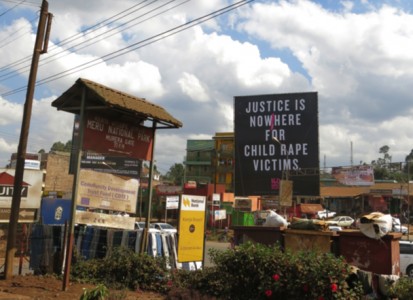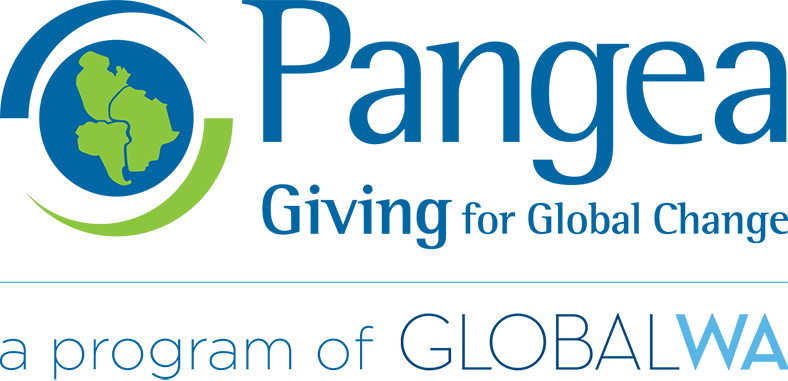Impressions from Kenya, Oct. 2013
Pangea Giving co-founder, Allan Paulson, recently returned from 15 days in Kenya visiting four of our current partners, two for the first time, and ‘interviewing’ a couple of other prospective partner organizations. Following are his impressions:
I arrived in Nairobi a few days after the end of the terrorist siege at Westgate Mall, not without misgivings. But I was met by a familiar face, Raphael Okumu, a long-time Pangea partner and iLEAP fellow. Raphael accompanied me on all the site visits and he opened his home to me in Nakuru. His insights were invaluable. Since I have been to Kenya four times in the past 7 years, it was hard not to make comparisons. In short, I have never been more impressed with the community development work that I was able to observe on this trip. Let me tell you why.
First, I noticed that our partners are using more sophisticated and comprehensive strategies to promote community change. Several of them talked about having a holistic or integrated approach. Rather than offering just one single program, the silver bullet approach of many Western NGOs, our partners are offering the community groups they work with a variety of interventions, trainings, tools and exchanges as the community requests them. In other words, they work closely with the community to address needs. As a result I saw lots of evidence of community ownership of the projects they are engaged in. The ‘profesa’ seen here (on the right) is in the training site he built on his farm, partly supported with Pangea funds. He is one of the leaders of his village and esteemed by his peers for his knowledge and commitment in implementing the diverse agro-ecological methods being taught by Bio Gardening Innovations. Hence, the nickname ‘profesa’.
As a result I saw lots of evidence of community ownership of the projects they are engaged in. The ‘profesa’ seen here (on the right) is in the training site he built on his farm, partly supported with Pangea funds. He is one of the leaders of his village and esteemed by his peers for his knowledge and commitment in implementing the diverse agro-ecological methods being taught by Bio Gardening Innovations. Hence, the nickname ‘profesa’.
Everywhere I went, village groups were engaged in ‘table banking’, which seems to be a very successful program to make small loans within the community and stimulate savings. The groups start with just a few thousand shillings, and several told me that after a year, they had accumulated through interest and additional savings, more than 200,000 KES, about $2500, which they loan out to members at each meeting and receive back at the next meeting at 10% interest.
Community involvement in our partner’s programs is becoming much more strategic. At CIFORD, where girls are guided through a 5-day alternative rite of passage to FGM, the elder women in the community participate to impart knowledge of the traditional tribal culture. In this way, the girls don’t feel they are missing out on their heritage, and the older women feel included and respected. Community leaders, like chiefs, principals and teachers, offer the girls cell-phone numbers with encouragement to call them if they are being abused or pressured to undergo genital mutilation.
At TEARS Group, their arts academy has developed its vocational skills emphasis into a business incubator program. Small groups of youth with similar interests form a support group to develop and implement their business plans. TEARS has gathered a team of volunteer mentors from the business and professional community in Nakuru to work with these groups. I had an opportunity to meet with the mentors at their first organizing meeting, and I was very impressed with the commitment and skill I observed.
I noticed that the strategies for supporting girl’s education and safety are becoming much deeper. There is high interest in child protection from abuse and rape, including legal advocacy and pressure on the police to take action. Many people told me that often girls need a place to go to get out of an abusive situation and continue to go to school. Three of the groups I visited are in the process of developing Girls’ Centers, part drop-in space for girls to do homework and receive trainings, but also a place with shelter beds, counseling and legal advocacy. The billboard (pictured below) in the middle of Meru illustrates the shift that is taking place.
 I am also happy to report that the Wasoni Women’s Cooperative at Common Ground is self-sufficient at this time. The loan fund that we gave them to pay women for their bags of maize and beans so that they can be stored and sold later at much more favorable prices, has been fully repaid for two years and with some retained profits is larger than the original grant. With this year’s grant, Wasoni is preparing to construct a Regional Trading Center on a beautiful piece of land that has been donated by the community, which will greatly increase their marketing potential. This land will also be the site of Common Ground’s new girl’s secondary school, which Director Joshua Machinga intends to give a strong entrepreneurial focus.
I am also happy to report that the Wasoni Women’s Cooperative at Common Ground is self-sufficient at this time. The loan fund that we gave them to pay women for their bags of maize and beans so that they can be stored and sold later at much more favorable prices, has been fully repaid for two years and with some retained profits is larger than the original grant. With this year’s grant, Wasoni is preparing to construct a Regional Trading Center on a beautiful piece of land that has been donated by the community, which will greatly increase their marketing potential. This land will also be the site of Common Ground’s new girl’s secondary school, which Director Joshua Machinga intends to give a strong entrepreneurial focus.
All-in-all, our Africa portfolio is in great shape. Each of our partners is having a significant impact in their community and I was impressed with both the quality of staff and organizational skills of our partners. As I left for home after visits that were too short -punctuated by drives that were too long – I heard Joshua Machinga’s voice, “We have the time, you have the watches.”
Past Africa Site Visit Blogs
Tanzania & Kenya 2010; Tanzania 2009; Kenya 2007;
(note: There were other site visits during other years but they were not documented by blogs.) All future site visits will be documented this way.
